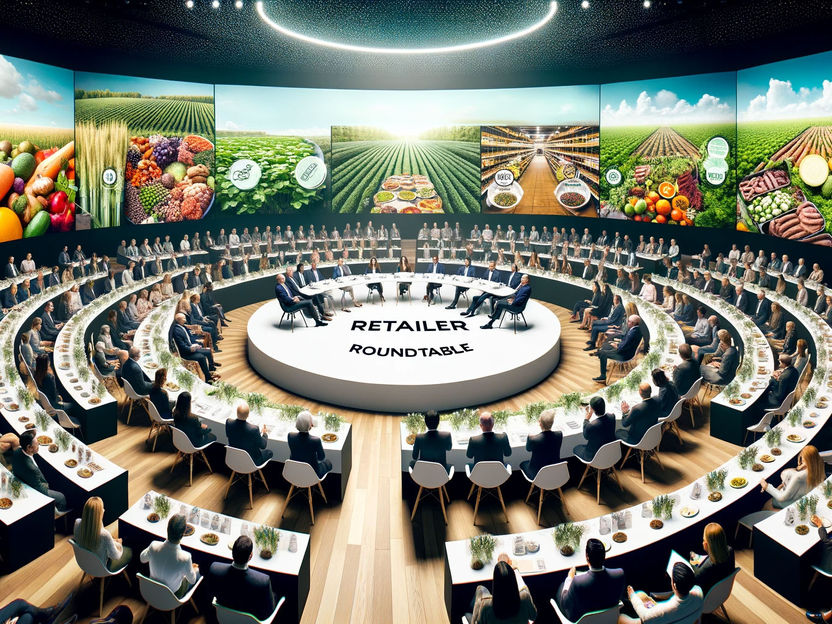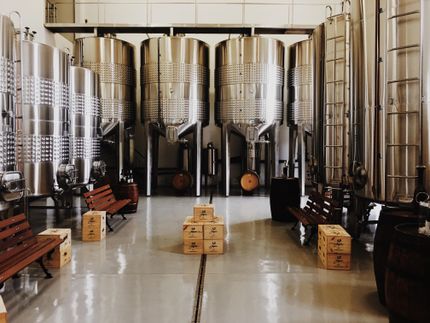ProVeg and top retailers want to make our diet fit for the future
Retailers expand plant-based assortment - and set visionary goals for themselves
Europe's leading retail groups will meet in Berlin on October 24 for ProVeg's first Retailer Roundtable, where participants will work together to help accelerate the adoption of sustainable food practices. Numerous industry leaders have already confirmed their participation in the event, including retail giants such as Lidl, Rewe, Colruyt, Albert Heijn, Billa and Biedronka.

Symbol image
computer generated pciture
Big task, big goals
Current climate data highlight the urgency of making diets more climate-friendly: our global food system is currently responsible for up to one-third of global greenhouse gas emissions.1 2 3 However, plant-based foods cause only half as many emissions as animal-based foods.4
The retail sector's targets are correspondingly ambitious: Albert Heijn aims to generate half of its sales from plant-based proteins by 2025, and 60 percent by 2030, according to Willem Dehing, Lead Category Manager Vega(n) at Albert Heijn. Lidl, for its part, aims to offer the best range of products for mindful and sustainable living by 2025, explains Myriam Taphorn, nutritionist and CSR consultant at the Lidl Foundation.
Retail stands for change
Among other topics, the roundtable will address how to price plant-based products and best marketing practices. The overarching goals are greater consumer choice and better coordination of industry sustainability efforts.
"Retailers are driving a lot of the climate-friendly dietary change for consumers," says Mathilde Alexandre, Corporate and Institutional Engagement Manager at ProVeg International. A number of retailers have already made great strides in promoting plant-based foods this year:
- Lidl announced in February that it would expand its plant-based offering and reduce the proportion of animal-based foods in its range as part of a sustainability drive. Lidl has since aligned the prices of plant-based private label products with those of their animal-based counterparts.
- Carrefour has formed a coalition with major corporations in France to achieve €3 billion in sales of plant-based foods by 2026.
- Dutch company Albert Heijn launched a new plant-based range in September, contributing to its goal of increasing the share of plant-based proteins to 60 percent by 2030.
With impact: be part of it!
Measures to increase the appeal of plant-based alternative products can make a big difference: plant-based products generally have a significantly smaller environmental footprint than animal-based ones.5 6 If consumers opt for a plant-based diet, they can even reduce their personal emissions from food by up to 50 percent.7 8 9 For many consumers, alternative products help them to increase the plant-based share of their diet in practice. ProVeg therefore has high hopes for the transformative power of retailers.
Retailers who would like to participate in this transformative event can contact ProVeg at. corporate@proveg.com Contact.
Sources
1 Babiker, M., G. Berndes et al. (2022): Cross-sectoral perspectives, in IPCC, 2022: Climate Change 2022: Mitigation of Climate Change. Contribution of Working Group III to the Sixth Assessment Report of the Intergovernmental Panel on Climate Change [P.R. Shukla, J. Skea, R. Slade, A. Al Khourdajie, R. van Diemen, D. McCollum, M. Pathak, S. Some, P. Vyas, R. Fradera, M. Belkacemi, A. Hasija, G. Lisboa, S. Luz, J. Malley, (eds.)]. Cambridge University Press, Cambridge, UK & New York, NY, USA.
2 Crippa, M., E. Solazzo et al. (2021): Food systems are responsible for a third of global anthropogenic GHG emissions. Nature Food. Doi: 10.1038/s43016-021-00225-9
3 Xu, X., P. Sharma et al. (2021): Global greenhouse gas emissions from animal-based foods are twice those of plant-based foods. Nature Food 2(9), 724-732. doi: 10.1038/s43016-021-00358-x
4 Xu, X., P. Sharma et al. (2021): Global greenhouse gas emissions from animal-based foods are twice those of plant-based foods. Nature Food 2(9), 724-732. doi: 10.1038/s43016-021-00358-x
5 Clark, M., M. Springmann et al. (2022): Estimating the environmental impacts of 57,000 food products. Proceedings of the National Academy of Sciences 119(33), e2120584119. Doi: 10.1073/pnas.2120584119
6 Reinhard, G., S. Gärtner & T. Wagner (2020): Ecological footprints of food and dishes in Germany. Institute for Energy and Environmental Research Heidelberg (ifeu). Heidelberg. Online at: https://www.ifeu.de/fileadmin/uploads/Reinhardt-Gaertner-Wagner-2020-Oekologische-Fu%C3%9Fabdruecke-von-Lebensmitteln-und-Gerichten-in-Deutschland-ifeu-2020.pdf
7 Hallström, E., A. Carlsson-Kanyama & P. Börjesson (2015): Environmental impact of dietary change: a systematic review. Journal of Cleaner Production 91 1-11. doi: 10.1016/j.jclepro.2014.12.008.
8 Scientific Advisory Council on Agricultural Policy, Nutrition and Consumer Health Protection & Scientific Advisory Council on Forest Policy at BMEL (2016): Climate change mitigation in agriculture, forestry, and the downstream sectors of food and wood use. Expert opinion. Berlin. Online at: https://www.bmel.de/SharedDocs/Downloads/DE/_Ministerium/Beiraete/agrarpolitik/Klimaschutzgutachten_2016.pdf?__blob=publicationFile&v=3
9 Kustar, A. & D. Patino-Echeverri (2021): A Review of Environmental Life Cycle Assessments of Diets: Plant-Based Solutions Are Truly Sustainable, even in the Form of Fast Foods. Sustainability 13(17), 9926. doi: 10.3390/su13179926.
Note: This article has been translated using a computer system without human intervention. LUMITOS offers these automatic translations to present a wider range of current news. Since this article has been translated with automatic translation, it is possible that it contains errors in vocabulary, syntax or grammar. The original article in German can be found here.
































































